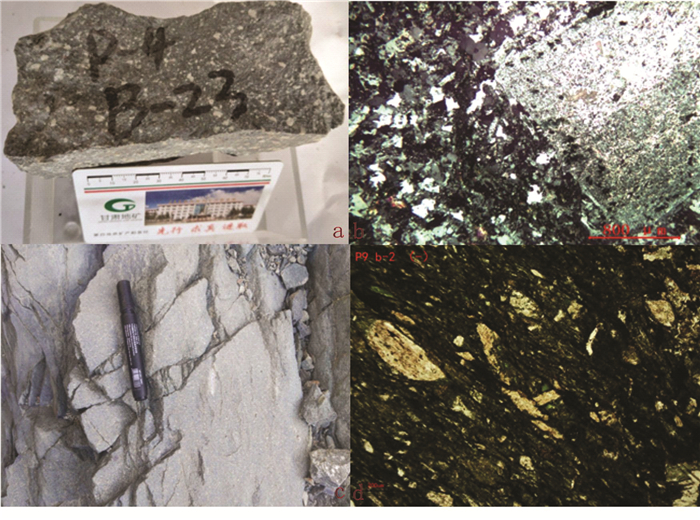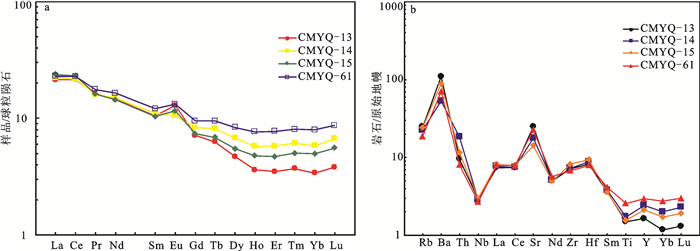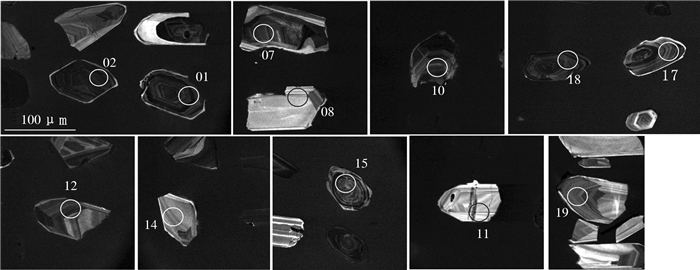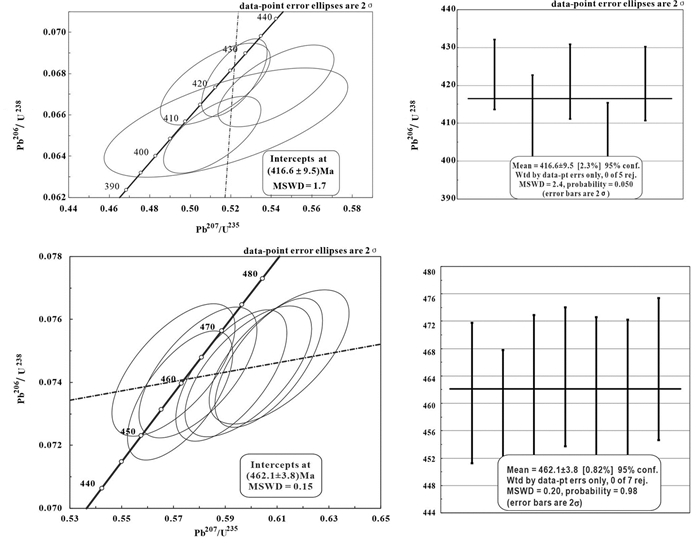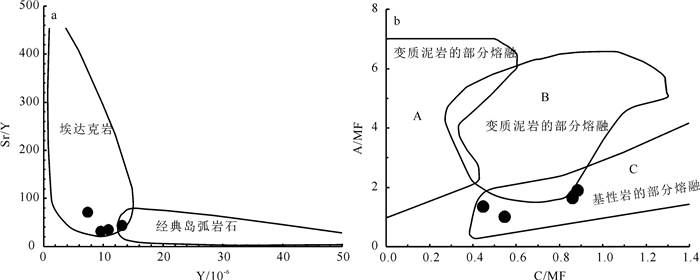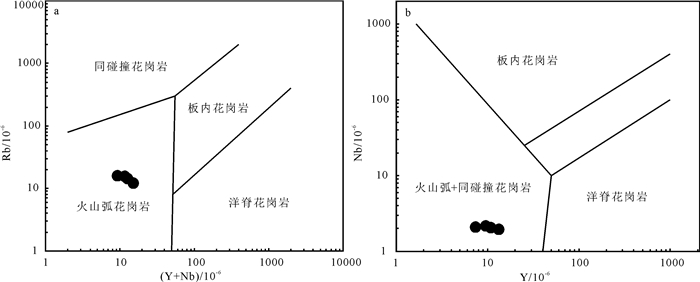U-Pb chronology, geochemical characteristics and petrogenesis of the Chelugou pluton in the western part of North Qilian orogenic belt
-
摘要:
车路沟岩体位于北祁连造山带最西端,岩石类型以英云闪长玢岩和闪长玢岩为主。本次对英云闪长玢岩进行U-Pb年代学研究,获得加权平均年龄为(462.1±3.8)Ma,表明岩体形成于中奥陶世。岩石地球化学分析结果显示,英云闪长玢岩中SiO2含量60.37%~66.73%,Al2O3含量15.65%~16.45%,Na2O/K2O值7.47~9.96,A/CNK为0.90~1.00,属中酸性岩系列,显示相对富钠、低钾的特征,A/CNK=0.90~1.00,属于准铝质低钾钙碱性系列;稀土总量较低(33.40×10-6~39.27×10-6),LREE/HREE值为3.95~6.51,在稀土元素配分图解上呈现出右倾特征;δEu值1.23~1.49之间,呈现Eu呈正异常特征;在微量元素原始地幔标准化图解上,显示富集Ba、Sr,亏损Nb、Ti、Yb高场强元素的特征。对车路沟岩体地质、地球化学特征与产出背景的全面分析,认为其为奥陶纪祁连洋持续向华北板块俯冲,诱使俯冲洋壳部分熔融形成的埃达克岩。
Abstract:Located at the westernmost end of the North Qilian orogenic belt, the Chelugou pluton consists predominantly of quartz diorite porphyry and diorite porphyry. Zircon LA-ICP-MS U-Pb dating of the Chelugou quartz diorite porphyry yielded an age of (462.1±3.8) Ma. Rocks from the Chelugou pluton show intermediate-felsic, metaluminous and low calc-alkaline features, with relatively low SiO2 (61.44%-67.63%), Al2O3 (15.09%-16.7%) and A/CNK values (0.90-1.00), and high Na2O/K2O ratios (7.47-9.96). They have relatively low rare earth element content (33.40×10-6-39.27×10-6) and are characterized by positive Eu anomaly and high LREE/HREE ratios (3.95-6.51), similar to features of typical adakites. All of the rocks are also enriched in Ba, Sr and depleted in HFSEs (e.g., Nb, Ti and Yb). By comprehensively synthesizing geochemical compositions and geological setting for magma rocks within the study area, the authors hold that the Chelugou granitoids were derived from partial melting of subducted oceanic plate related to the northward subduction of the Qilian Ocean underneath the North China Block in Ordovician.
-
1. 引言
祁连山位于华北板块西南缘,与秦岭、昆仑一起构成中国大陆内部巨型的中央造山带,是中国大陆主要造山带之一。北祁连造山带雄踞于河西走廊之南,成为青藏高原的东北界,东南与西秦岭相连,西北被阿尔金山截断(葛肖虹等,1999;杨永春等,2019;图 1a)。前人通过大量岩石学、沉积等研究对北祁连洋盆的俯冲极向做过研究,主要形成了双向俯冲(肖序常等,1978;王荃等,1981;左国朝等,1987;吴才来等,2010)、向北俯冲(许志琴等,1994;夏林圻等, 1996, 1998;张建新等, 1997, 1998;夏林圻等,2016)、向南俯冲(宋述光,1997;刘传周等,2005),目前尚无统一的认识。已有研究表明,通过花岗岩类地球化学特征及同位素年代学的研究可以提供有关其形成的大地构造背景信息,可以作为地质构造示踪剂(徐卫东等,2007;秦海鹏,2012)。目前,在北祁连山造山带毛藏寺、银硐梁、大野口等多处发现有埃达克岩或埃达克质岩石,这类岩石为区域构造背景研究提供了依据,本文试图利用车路沟岩体对北祁连构造演化进行研究。
研究区位于北祁连造山带西段,区内广泛发育寒武系黑茨沟组裂谷火山岩(王晓伟等,2018)、奥陶系阴沟群和扣门子组岛弧-弧后扩张脊型火山岩以及志留系复理石沉积,分布有俯冲混杂岩带,具有典型的沟弧盆体系(夏林圻等,2001),车路沟岩体位于前人所划分的奥陶系岛弧火山岩-沉积岩系中。前人对岩体特征和时代做了一些研究(杨建国等,2003;宋忠宝等,2004;贾群子等,2005),但多围绕其与金成矿作用方面的研究,宋忠宝等(2005)通过对车路沟中英安斑岩进行年代学、地球化学研究,认为车路沟岩体属于碰撞型花岗岩类,形成于碰撞作用晚期。本文通过对车路沟岩体中英云闪长玢岩的岩石学、地球化学、锆石U-Pb年代学等方面的研究,分析其岩石成因,揭示其形成时的构造背景,为北祁连造山带构造演化提供约束。
2. 区域地质概况
研究区大地构造位置属北祁连早古生代造山带西段之西端(杨建国等,2003),距离北祁连造山带与阿尔金断裂交汇部位4 km。区域上地层北部有古元古界敦煌岩群零星分布外,以古生界为主,主要有寒武系、奥陶系、志留系,其次为石炭系。区域上侵入岩较为发育,以明芨芨沟岩体、青石峡岩体、青山岩体和车路沟岩体为主,分布范围较大,多呈岩株状分布,展布方向和区域构造线方向基本一致,多呈北西、北西西向。
车路沟岩体位于北祁连造山带西段,紧邻阿尔金走滑断裂南侧,出露面积较大(图 1b),自阴凹大泉至照壁山一带广泛分布,多侵入于奥陶系扣门子组中,岩体被断裂构造破坏严重,形态呈不规则块状,呈岩基状东西向条带状分布,边界明显的受控于断裂构造(夏林圻等,2001),多与地层呈断层接触,接触部位具明显的片理化,反映岩体的形成与板块俯冲、碰撞和造山带上不同的块体之间的构造作用密切相关(吴才来等,2010)。
![]() 图 1 车路沟一带地质简图1—第四系冲、洪积物;2—二叠系砂岩;3—石炭系砂岩;4—志留系复理石建造;5—奥陶系扣门子组火山岩系;6—奥陶系中堡群火山-碎屑岩系;7—奥陶系阴沟群火山岩系;8—石英二长闪长岩;9—英云闪长玢岩;10—闪长玢岩;11—实测断裂构造;12—同位素测年样品采样位置;13—岩石全分析样品采样位置Figure 1. Regional geological map of the Chelugou pluton1- Quaternary; 2- Permian sandstone; 3- Carboniferous sandstone; 4- Silurian flysch formation; 5- Volcanic rocks of Ordovician Koumenzi Formation; 6- Volcanic clastic rocks of Ordovician Zhongbu Group; 7- Volcanic rocks of Ordovician Yingou Group; 8- Quartz monzodiorite; 9- Quartz mica dioritic porphyry; 10-Diorite porphyry; 11-Fault; 12-Sampling position for isotope dating; 13- Sampling position for rock analysis
图 1 车路沟一带地质简图1—第四系冲、洪积物;2—二叠系砂岩;3—石炭系砂岩;4—志留系复理石建造;5—奥陶系扣门子组火山岩系;6—奥陶系中堡群火山-碎屑岩系;7—奥陶系阴沟群火山岩系;8—石英二长闪长岩;9—英云闪长玢岩;10—闪长玢岩;11—实测断裂构造;12—同位素测年样品采样位置;13—岩石全分析样品采样位置Figure 1. Regional geological map of the Chelugou pluton1- Quaternary; 2- Permian sandstone; 3- Carboniferous sandstone; 4- Silurian flysch formation; 5- Volcanic rocks of Ordovician Koumenzi Formation; 6- Volcanic clastic rocks of Ordovician Zhongbu Group; 7- Volcanic rocks of Ordovician Yingou Group; 8- Quartz monzodiorite; 9- Quartz mica dioritic porphyry; 10-Diorite porphyry; 11-Fault; 12-Sampling position for isotope dating; 13- Sampling position for rock analysis3. 岩石学特征
车路沟岩体主要由英云闪长玢岩、闪长玢岩组成,局部为石英闪长玢岩、英云闪长岩等,岩体与地层接触部位产出车路沟金矿、昌马金矿等多个金矿床。主要岩石特征如下:
英云闪长玢岩,灰白色,斑状结构,基质微粒花岗结构,块状构造。斑晶主要是斜长石和角闪石(10%~15%),粒径0.25~1.90 mm。斜长石为自形—半自形晶板条状,角闪石多为长柱状,斜长石具高岭土化、绿帘石化。基质成分由长石、角闪石、石英和不透明矿物组成,粒径小于0.10 mm(图 2a,b)。
闪长玢岩,浅灰黑色,斑状结构,显微粒状半自形柱状粒状结构,块状构造。斑晶为角闪石及少量斜长石,大小一般1~5 mm,星散状分布,含量15%~20%。基质为斜长石、石英、角闪石,大小一般0.1~0.2 mm,少0.02~0.1 mm(细),部分0.2~0.3 mm(细),杂乱分布。具绢云母化、绿帘石化、碳酸盐化(图 2c,d)。
4. 样品采集及分析方法
本次工作分别在岩体的不同地方采集了4件新鲜的岩石样品,做了岩石地球化学全分析,所采岩石类型均为英云闪长玢岩,样品重量均大于2 kg,利用玛瑙球磨机研磨至200目进行分析,样品加工由河北省区域地质调查研究所实验室承担,样品的加工过程均是在无污染设备中进行。在岩体西部二家台一带采集了新鲜英云闪长玢岩岩石样品1件,样品重量为11.3 kg,以挑选锆石进行U-Pb同位素测年。
锆石分选、制靶、透反射光拍照和阴极发光拍照均在廊坊诚信地质服务有限公司完成。锆石的激光剥蚀电感耦合等离子体质谱(LA-ICP-MS)原位U-Pb定年在中国地质调查局西安地质调查中心自然资源部岩浆作用成矿与找矿重点实验室完成。激光剥蚀系统为GeoLas Pro,ICP-MS为Agilent 7700x。激光剥蚀过程中采用氦气作载气、氩气为补偿气以调节灵敏度。对分析数据的离线处理(包括对样品和空白信号的选择、仪器灵敏度漂移校正、元素含量及U-Th-Pb同位素比值和年龄计算)采用软件Glitter 4.4完成,详细仪器参数和测试过程参见李艳广等(2015)。采用锆石标准91500作为标样进行同位素分馏校正。对于与分析时间有关的U-Th-Pb同位素比值漂移,利用91500的变化采用线性内插的方式进行了校正。锆石样品的U-Pb年龄谐和图绘制和年龄权重平均计算均采用Isoplot Exver 3完成。
5. 分析结果
5.1 地球化学特征
从表 1可知,岩石中SiO2含量60.37% ~66.73%,平均63.75%,Al2O3含量15.65%~16.45%,平均16.01%,Na2O/K2O值7.47~9.96,平均8.38,Na2O高于K2O数倍,P2O5含量SiO2呈反比,与表明其源于贫钾的玄武质岩石(张旗等,2002),为I型花岗岩,里特曼指数(σ43)1.28~2.22,为低钾富钠钙碱性花岗岩,A/CNK为0.90~1.00,平均0.93,为准铝质,且经CIPW标准矿物计算出现刚玉,说明具有活动大陆边缘环境I-S过渡型花岗岩的特征(秦海鹏,2012)。MgO含量1.78~3.95,平均2.63;分异指数DI大于59.55,分异程度中等略高。
表 1 车路沟岩体主量元素(%)、微量元素(10-6)分析结果Table 1. Analytical results of major elements (%) and trace elements (10-6) of the Chelugou rock mass
从微量元素原始地幔标准化蛛网图中可以看出(图 3、表 1),大离子亲石元素(LILE)富集Ba、Sr、Hf,高场强元素(HFSE)明显贫Nb、Ti、Yb,相对富集Zr。稀土总量33.40×10-6~39.27×10-6,平均35.99×10-6,远低于中性岩稀土总量196×10-6和花岗岩稀土总量290×10-6。LREE/HREE值3.95~6.51,轻稀土元素较富集,HREE含量较低,平均6.01×10-6,Y含量7.46×10-6~13.44×10-6,Yb含量0.58×10-6~1.36×10-6,(La/Yb)N值2.87~6.29(表 1),稀土元素球粒陨石标准化分配曲线为右倾型(图 3),轻、重稀土元素分异明显,δEu值1.23~1.49,Eu呈正异常,说明岩浆源区无残留斜长石。稀土元素特征与埃达克岩亏损重稀土、低Y、Yb及正铕异常的特征相符(Defant et al., 1990)。
5.2 U-Pb年代学特征
锆石多呈长柱状或菱形柱体,为典型的锆石晶体形状,多呈自形、半截状,锆石具有明显的震荡环带,部分锆石内部有继承核存在,生长纹路清晰,为典型的岩浆锆石(图 4),本次利用LA ICP-MS对锆石进行了测试,锆石Th/U比值0.07~1.73,平均0.57,具岩浆锆石的特征(表 2)。测试结果中,共有12个测试点具有谐和年龄,表面年龄分为2组(图 5),第一组有5个点,表面年龄406.2~422.9 Ma,获得加权平均年龄(416.6±9.5)M a,MSWD =1.7;第二组有7个点,表面年龄457.7~465 Ma,获得加权平均年龄(462.1±3.8)Ma,MSWD=0.15。第二组年龄应是岩浆侵位结晶年龄,第一组年龄可能反映了后期的岩浆热事件。
表 2 车路沟岩体中LA ICP-MS锆石U-Pb同位素测年结果Table 2. Zircon LA ICP-MS U-Pb isotopic data of the Chelugou pluton
5.3 年代学讨论
宋忠宝等(2005)在车路沟岩体中采集英安斑岩同位素样品进行了U-Pb同位素年龄为(427.7±4.5)Ma,本次工作在开展区内地质调查过程中,结合薄片鉴定认为,前人所认为的英安斑岩即为车路沟岩体中的闪长玢岩,贾群子等(2007)在岩体西部二家台沟采集英云闪长玢岩进行了单颗粒锆石U-Pb年龄测定,获得加权平均年龄为(445.6±3.2)Ma,认为该年龄是锆石的结晶年龄,接近岩体的形成年龄。
结合前人测试结果,笔者认为车路沟岩体可能为复式岩体或者岩浆演化经历了较长的时间,岩体中两种岩性整体为同源岩浆演化,岩体演化早期阶段为英云闪长玢岩为主,伴随有中酸性—中性岩浆的分异,后期演化为闪长玢岩。因此,该岩体就位时间为(462.1±3.8)Ma,为中奥陶世。
6. 讨论
埃达克岩是一套具有特定地球化学特征的钙碱性中酸性喷出/侵入岩(Defant et al., 1990),具有高SiO2(≥56%)、高铝(Al2O3≥15%)、富钠(Na2O>K2O)、高Sr(>400×10-6)、低Y(<18×10-6)和Yb(<1.9×10-6)以及不明显的Eu异常等地球化学特征。车路沟岩体SiO2含量为60.37% ~66.31%,Al2O3含量15.72%~16.45%,Na2O含量4.86%~6.19%,K2O含量0.62%~0.72%,Na2O/K2O为7.47~9.96,Sr含量299.52×10-6~525.85×10-6,Y含量7.46×10-6~13.44×10-6,Yb含量0.58×10-6~1.36×10-6,Sr/Y值为30.90~70.48。该岩体轻稀土富集,轻重稀土分馏明显,亏损高场强元素,同时在Y-Sr/Y图解中(图 6a)全部落入埃达克岩区域。上述特征表明,车路沟岩体与典型埃达克岩的特征一致(Defant et al., 1990, 2002;毛启贵等, 2010;Zheng et al., 2018)。
埃达克岩最早被认为是由于年轻的俯冲大洋板片在榴辉岩相下熔融形成火山岩和侵入岩(Defant et al., 1990),随着研究的深入,越来越多与埃达克岩相似地球化学属性的岩石被发现。目前对埃达克岩的成因模式主要有以下4种:(1)俯冲洋壳的部分熔融,随后与上覆楔形地幔橄榄岩发生反应形成埃达克岩(Defant et al., 1990, 2002;Kay,1993;Martin et al., 2005;Wang et al., 2007, 2008a;Tang et al., 2010;毛启贵等, 2010;Zheng et al., 2018);(2)含水玄武质岩浆高/低压条件下发生结晶分异作用(Castillo et al., 1999, 2012;Macpherson et al., 2006);(3)受玄武质岩浆底侵作用或俯冲大陆地壳发生部分熔融产物(Wang et al., 2008b;Lai et al., 2013);(4)增厚下地壳拆沉作用导致部分熔融产生的流体和地幔橄榄岩相互作用形成的高Mg#埃达克岩(Rudnick et al., 1995;Wareham et al., 1997;Chung et al., 2003;Gao et al., 2004;Wang et al., 2006;朱涛等,2014;王楠等,2016)。
车路沟岩体岩石地球化学研究表明,K2O含量0.62%~0.72%,Na2O/K2O值7.47~9.96,与洋壳特征相似,其岩石类型为富Na2O的钙碱性岩浆,这与俯冲洋壳熔融形成的埃达克岩一致(Defant et al., 2002)。岩体具较高的Cr(27.30 × 10-6~70.79 × 10-6)、Ni(27.01×10-6~46.65×10-6)及Mg#值(52.24~59.79),应该是板片俯冲熔融产生的埃达克岩浆与地幔楔相互作用导致MgO加入的结果。车路沟岩体以较低的Nb(1.92×10-6~2.15×10-6)含量与洋岛玄武岩(>20×10-6)Nb值存在明显的差异,反映其并非含水玄武质岩浆结晶分异而成。俯冲大陆地壳发生部分熔融产生的埃达克岩,具有明显的富钾特征(K2O>Na2O),较高的Th含量、Th/U、Th/Ba和Rb/Ba比值,以及Sr的弱异常。车路沟岩体具富钠特征(Na2O>K2O),具有较低的Th含量(0.68 × 10-6~1.57×10-6),以及较低的Th/Ba(0.001~0.004)和Rb/Ba(0.02~0.04)比值和较高的Sr含量(299.52 ×10-6~525.85×10-6),可与俯冲大陆地壳发生部分熔融产生的埃达克岩相区别。拆沉下地壳熔融产生的埃达克岩浆在上升过程中与地幔橄榄岩发生反应从而获得较高的Mg#,拆沉下地壳来源的埃达克岩通常含有壳源继承锆石,而本次研究中锆石结构均一,没有继承性锆石。因此,车路沟岩体应为俯冲洋壳熔融形成的埃达克岩,而非其他成因的埃达克岩。
地球化学特征表明车路沟岩体源于贫钾的玄武质岩石,通过A/MF-C/MF图解对岩浆成因进行了判别,所有数据均落入基性岩的部分熔融(图 6b),推测岩浆来源与新生基性火山岩的部分熔融有关(Zhang et al., 2017),这一点,在野外地质分布特征中也可以分辨,岩体大部分侵入于奥陶系扣门子组弧后扩张型火山岩中,但未见到志留纪复理石建造中有侵入特征,说明其形成与俯冲作用有关。车路沟岩体δEu变化范围为1.10~1.49,平均1.285,表明在岩浆分离结晶过程中斜长石不占据元素总分配系数的主导地位,岩浆中应残留石榴子石或者角闪石。前人研究认为,岩浆源区中以角闪石为残留相时,形成的熔体具轻微上凹的HREE配分模式,且Y/Yb比值一般接近10;当源区中以石榴子石为残留相时,形成的熔体具有倾斜的HREE配分模式同时其Y/Yb比值明显大于10(Rollinson, 1993; 高永丰等,2003)。车路沟岩体Y/Yb比值为9.91~12.90,平均为11.34,稀土配分模式显示(图 3),其为基本向右倾斜的HREE配分模式,表明岩浆岩区残留相以石榴子石为主,由此推测车路沟埃达克岩体来源于基性玄武质岩浆的部分熔融。
在(Y+Nb)-Rb和Y-Nb构造判别图上(图 7),车路沟岩体分别落入火山弧花岗岩(VAG)和火山弧+同碰撞花岗岩(VAG+Sny+COLG)区域内,反映出与火山弧花岗岩的亲缘性。同时,岩体Nb、Ti的负异常其形成于俯冲背景下,Cr、Ni正异常代表有地幔物质的参与。由此推测,车路沟岩体可能是俯冲板片流体交代地幔楔诱发地壳富含石榴石相的基性玄武岩质岩石部分熔融,并在上升过程中混染了火山弧物质所形成的埃达克岩。
区域构造研究表明,北祁连从古元古代中期开始,大陆岩石圈拉伸、减薄,并发生裂谷化(左国朝等,1987;夏林圻等, 1996, 2000;葛肖虹等,1999); 至新元古代,裂谷作用进一步加强,发育以双峰式火山岩为特征的大陆裂谷火山作用;到晚寒武世,最终发生大陆裂解和分离,形成北祁连早古生代洋盆,于奥陶纪北祁连洋盆进入俯冲消减和弧后盆地协同演化阶段,发育大量岛弧和弧后盆地火山岩(左国朝等,1987;夏林圻等, 1991, 1996;葛肖虹等,1999;张旗等,2000;Xia et al., 2003;曾建元等,2007;夏小洪等,2010;Song et al., 2013),至445~424 Ma,洋盆闭合进入陆内碰撞和深俯冲过程(Xia et al., 2003;吴才来等,2006;Zhang et al., 2007)。夏林圻等认为,北祁连加里东造山带是在前寒武纪基底之上发生拉张(679~574 Ma), 至寒武纪末期到早奥陶世(522~495 Ma)形成洋盆,奥陶纪(469~445 Ma)自南西向北东往华北大陆板块之下俯冲,大洋板块持续俯冲致使洋盆闭合(445~428 Ma)。
前人在北祁连造山带中段毛藏寺、北祁连东段银硐梁、北祁连走廊南山北坡大野口均发现了埃达克岩,上述埃达克岩体同位素年龄集中在446~455.8 Ma,均为北祁连早古生代沟弧盆构造环境的产物(王金荣等,2006;赵辛敏等,2018;唐卓等,2018)。本文获得的车路沟岩体的结晶年龄为(462.1±3.8)Ma,与前人研究认为祁连洋向北俯冲的时间吻合,说明车路沟岩体是在奥陶纪祁连洋自南西往北东持续向华北板块之下俯冲过程中形成的。
如前文所述,车路沟岩体具埃达克岩特征,是奥陶纪时期与祁连洋持续向华北板块俯冲作用有关的俯冲洋壳部分熔融和壳幔岩浆混合成因的花岗岩。
7. 结论
(1)车路沟岩体为准铝质低钾钙碱性系列,具有富硅、富铝、富钠、高Mg#、高Sr、高Sr/Y和低HREE、低Y、低Yb的特征,具典型埃达克岩的地球化学特征。
(2)车路沟岩体中英云闪长玢岩的锆石LA -ICP-MS U-Pb测年结果表明,其结晶年龄为(462.1±3.8)Ma,属中奥陶世。
(3)根据岩石学、岩石地球化学研究,结合前人区域构造研究成果,推测车路沟岩体为奥陶纪祁连洋持续向华北板块俯冲,诱使俯冲洋壳部分熔融形成的埃达克岩。
致谢: 成文过程中中国地质调查局西安地质调查中心王国强博士、兰州大学赵姣龙博士、甘肃省地矿局四勘院张立涛高级工程师与作者进行了有益的交流,提供了中肯的建议和意见;论文数据得益于甘肃省地矿局第四勘查院地质调查所项目分队技术人员;两位匿名审稿人对本文提出了宝贵的修改意见,使本文的质量进一步提高。在此一并表示衷心感谢。 -
图 1 车路沟一带地质简图
1—第四系冲、洪积物;2—二叠系砂岩;3—石炭系砂岩;4—志留系复理石建造;5—奥陶系扣门子组火山岩系;6—奥陶系中堡群火山-碎屑岩系;7—奥陶系阴沟群火山岩系;8—石英二长闪长岩;9—英云闪长玢岩;10—闪长玢岩;11—实测断裂构造;12—同位素测年样品采样位置;13—岩石全分析样品采样位置
Figure 1. Regional geological map of the Chelugou pluton
1- Quaternary; 2- Permian sandstone; 3- Carboniferous sandstone; 4- Silurian flysch formation; 5- Volcanic rocks of Ordovician Koumenzi Formation; 6- Volcanic clastic rocks of Ordovician Zhongbu Group; 7- Volcanic rocks of Ordovician Yingou Group; 8- Quartz monzodiorite; 9- Quartz mica dioritic porphyry; 10-Diorite porphyry; 11-Fault; 12-Sampling position for isotope dating; 13- Sampling position for rock analysis
表 1 车路沟岩体主量元素(%)、微量元素(10-6)分析结果
Table 1 Analytical results of major elements (%) and trace elements (10-6) of the Chelugou rock mass

表 2 车路沟岩体中LA ICP-MS锆石U-Pb同位素测年结果
Table 2 Zircon LA ICP-MS U-Pb isotopic data of the Chelugou pluton

-
Castillo P R, Janney P E, Solidum R U. 1999. Petrology and geochemistry of Camiguin island, southern Philippines:Insights to the source of adakites and other lavas in a complex arc setting[J]. Contributions to Mineralogy and Petrology, 134(1):33-51. doi: 10.1007/s004100050467
Castillo P R. 2012. Adaktie petrogenesis[J]. Lithos, 134-135; 304-316. doi: 10.1016/j.lithos.2011.09.013
Chung Sunlin, Liu Dunyi, Ji Jianqing, Chu Meifei, Lee Haoyang, Wen Dajen, Lo Chinghua, Lee Tungyi, Qian Qing, Zhang Qi. 2003.Adakites from continental collision zones:Melting of thickened lower crust beneath southern Tibet[J]. Geology, 31(11):1021-1024. doi: 10.1130/G19796.1
Defant M J, Drummond M S. 1990. Derivartion of some modern arc magmas by melting of young subduction lithosphere[J]. Nature, 990:662-665. http://www.nature.com/articles/347662a0
Defant M J, Xu Jifeng, Kepezhinskas P, Wang Qiang, Zhang Qi, Xiao Long. 2002. Adakites:Some variations on a theme[J]. Acta Petrologica Sinica, 18(2):129-142. http://d.old.wanfangdata.com.cn/Periodical/ysxb98200912005
Gao Shan, Rudnick R L, Yuan Hongling, Liu Xiaoming, Liu Yongsheng, Xu Wenliang, Ling Wenli, John Ayers, Wang Xuanche, Wang Qinghai. 2004. Recycling lower continental crust in the North China craton[J]. Nature, 432(7019):892-897. doi: 10.1038/nature03162
Gao Yongfeng, Hou Zengqian, Wei Ruihua. 2003. Neogene porphyries from gangdese:petrological geochemical characteristics and geodynamic significances[J]. Acta Petrologaca Sinica, 19(3):418-428(in Chinese with English abstract). http://cn.bing.com/academic/profile?id=596005890ba47dc617cb74b5585e5dcf&encoded=0&v=paper_preview&mkt=zh-cn
Ge Xiaohong, Liu Junlai. 1999. Formation and tectonic background of the northern Qilian Orogenic belt[J]. Earth Science Frontiers, 6(4):223-230 (in Chinese with English abstract). http://www.wanfangdata.com.cn/details/detail.do?_type=perio&id=dxqy199904004
Jia Qunzi, Yang Zhongtang, Xiao Chaoyang, Quan Shoucun, Zou Xianghua. 2007. Metallogenic regularity and metallogenic prediction of the Qilian Mountain copper-gold-tungsten-leadzinc deposit[M]. Beijing:Geological Publishing House, 75-139.(in Chinese).
Kay R W, Ramos V A, Marquex M. 1993. Evidencein Cerro Pampa volcanic rocks of slab melting prior to ridge trench collision in southern South America[J]. Journal of Geology, 101:703-714. doi: 10.1086/648269
Lai Shaocong, Qin Jiangfeng. 2013. Adakitic rocks derived from the partial melting of subducted continental crust:Evidence from the Eocene volcanic rocks in the northern Qiangtang block[J]. Gondwana Research, 23(2):812-824.l doi: 10.1016/j.gr.2012.06.003
Li Yanguang, Wang Shuangshuang, Liu Minwu, Meng En, Wei Xiaoyan, Zhao Huibo, Jin Mengqi. 2015. U-Pb dating Study of Baddeleyite by LA-ICP-MS technique and application[J]. Acta Geologica Sinica, 89(12):2400-2418(in Chinese with English abstract). http://www.wanfangdata.com.cn/details/detail.do?_type=perio&id=dizhixb201512015
Liu Chuanzhou, Xiao Wenjiao, Yuan Chao, Yan Zhen. 2005. The petrological and geological characteristics of the Zhamashi mafic complex, Qilian Mountain and their tectonic implications[J]. Acta Petrologica Sinica, 21(1):57-64(in Chinese with English abstract).
Mao Qigui, Xiao Wenjiao, Han Chunming, Sun Min, Yuan Chao, Zhang Jien, Ao Songjian, Li Jiliang. 2010. Discovery of Middle Silurian adakite granite and its tectonic significance in Liuyuan area, Beishan Moutains, NW China[J]. Acta Petrologica Sinica, 26(2):584-596(in Chinese with English abstract). http://www.wanfangdata.com.cn/details/detail.do?_type=perio&id=ysxb98201002019
Macpherson C G, Dreher S T, Thirwall M F. 2006. Adakites without slab melting:high pressure differentiation of island arc magma, Mindanao, the Phillippines[J]. Earth and Planetary Science Letters, 243:581-593. doi: 10.1016/j.epsl.2005.12.034
Martin H, Smithies R H, Rapp R, Moyen J F, Champiom D. 2005. An overview of adakite, tonalite-trondhjemite-granodiorite (TTG), and sanukitoid:relationships and some implications for crustal evolution[J]. Lithos, 79:1-24. doi: 10.1016/j.lithos.2004.04.048
Qin Haipeng. 2012. Petrology of Early Paleozoic Granites and Their Relation to Tectonic Evolution of Orogen in the North Qinlian Orogenic Belt[D]. Beijing: Chinese Academy of Geological Sciences, 1-26. (in Chinese with English abstract).
Rollinson H R. 1993. Using Geochemical Data: Evaluation, Presentation, Interpretation[M]. Longman Singapore Publishers(Pte)Ltd., Singapore, 1-352.
Rudnick R L. 1995. Making continental crust[J]. Nature, 378:571-578. doi: 10.1038/378571a0
Song Shuguang. 1997. Tectonic evolution of subdutive complex belts in the north Qilian Mountains[J]. Advance in Earth Sciences, 12(4):351-365(in Chinese with English abstract).
Song Shuguang, Niu Yaoling, Su Li, Xia Xiaohong. 2013. Tectonics of the North Qilian orogen, NW China[J]. Gondwana Research, 23:1378-1401. doi: 10.1016/j.gr.2012.02.004
Song Zhongbao, Li Zhipei, Ren Youxiang, Yang Jianguo, Li Yazhi, Xie Chunlin. 2005. Chronology and geological significance of Chelugou dacite porphyry in North Qilian Mountains[J]. Geological Science and Technology Information, 24(3):15-19(in Chinese with English abstract). http://www.wanfangdata.com.cn/details/detail.do?_type=perio&id=dzkjqb200503003
Tang Gongjian, Wang Qiang, Wyman D A, Li Zhengxiang, Zhao Zhen-Hua, Jia Xiao-Hui, Jiang Ziqi. 2010. Ridge subduction and crustal growth in the Central Asian Orogenic Belt:Evidence from Late Carboniferous adakites and high-Mg diorites in the western Junggar region, northern Xinjiang (west China)[J]. Chemical Geology, 277(3-4). http://cn.bing.com/academic/profile?id=3b3cfc19b8f7e45e5fab3b072eb4bce2&encoded=0&v=paper_preview&mkt=zh-cn
Tang Zhuo, Wang Guoqiang, Li Xiangmin, Zhu Tao, Luo Gengen, Ji Bo, Bu Tao. 2018. Genesis and tectonic implications of Caledonian Dayekou adakite diorite porphyry of Xishui area, Zoulangnanshan, North Qilian Moutain[J]. Geological Bulletin of China, 37(4):1444-1480 (in Chinese with English abstract).
Wang Jinrong, Wu Chunjun, Cai Zhenghong, Guo Yuansheng, Wu Jicheng, Liu Xiaohuang. 2006. Early Paleozoic high-Mg adakite from Yingdongliang in the eastern section of the North Qilian:Implications for geodynamics and Cu-Au minerallzation[J]. Acta Petrologica Sinca, 22(11):2655-2664 (in Chinese with English abstract).
Wang Nan, Wu Cailai, Ma Changqian, Lei Min, Guo Wenfeng, Zhang Xin, Chen Hongjie. 2016. Geochemistry, zircon U-Pb geochronology and Hf isotopic characteristics for Granites in southern Dunhuang block[J]. Acta Petrologica Sinica, 32(11):3753-3780(in Chinese with English abstract). https://www.researchgate.net/publication/313309853_Geochemistry_zircon_U-Pb_geochronology_and_Hf_isotopic_characteristics_for_Granites_in_southern_Dunhuang_block
Wang Qiang, Wyman D A, Zhao Zhenhua, Xu Jifeng, Bai Zhenghua, Xiong Xiaolin, Dai Tongmo, Li Chaofeng, Chu Zhuyin. 2007.Petrogenesis of Carboniferous adakites and Nb-enriched arc basalts in the Alataw area, northern Tianshan Range (western China):Implications for Phanerozoic crustal growth in the Central Asia orogenic belt[J]. Chemical Geology, 236(1/2):0-64. http://cn.bing.com/academic/profile?id=105a7c50a4abc55f2b3386e3317a759b&encoded=0&v=paper_preview&mkt=zh-cn
Wang Qiang, Wyman D A, Xu Jifeng, Wan Yusheng, Li Chaofeng, Zi Feng, Jiang Ziqi, Qiu Huaning, Chu Zhuyin, Zhao Zhenhua, Dong Yanhui. 2008a. Triassic Nb-enriched basalts, magnesian andesites, and adakites of the Qiangtang terrane (Central Tibet):Evidence for metasomatism by slab-derived melts in the mantle wedge[J]. Contributions to Mineralogy and Petrology, 155(4):473-490. doi: 10.1007/s00410-007-0253-1
Wang Qiang, Wyman D A, Xu Jifeng, Dong Yanhui, Vasconcelos P M, Pearson N, Wan Yusheng, Dong Han, Li Chaofeng, Yu Yuanshan, Zhu Tongxing, Feng Xintao, Zhang Qiyue, Zi Feng, Chu Zhuyin. 2008b. Eocene melting of subducting continental crust and early uplifting of central Tibet:Evidence from central-western Qiangtang high-K calc-alkaline andesites, dacites and rhyolites[J]. Earth and Planetary Science Letters, 272(1/2):0-171. http://cn.bing.com/academic/profile?id=d13f374b99e8c7d7a2229f6031ec31f1&encoded=0&v=paper_preview&mkt=zh-cn
Wang Qiang, XU Ji-Feng, Jian Ping, Bao Zhiwei, Zhao Zhenhuan, Li Chaofeng, Xiong Xiaolin, Ma Jinlong. 2006. Petrogenesis of adakitic porphyries in an extensional tectonic setting, Dexing, South China:Implications for the Genesis of Porphyry Copper Mineralization[J]. Journal of Petrology, 47(1):119-144. doi: 10.1093/petrology/egi070
Wang Quan, Liu Xueya. 1981. Ophiolite belt and plate tectonics in China[J]. Journal of Jilin University (Earth Science Edition), (1):72-81. (in chinese). http://d.old.wanfangdata.com.cn/Periodical/dqkx-e201203004
Wang Xiaowei, Yang Chunxia, Wang Yuxi, Yu Man. 2018.Geochemistry of Cambrian high-Mg andesites in north Qilian and its geodynamic implications[J]. Northwestern Geology, 51(1):34-43(in Chinese with English abstract). http://www.wanfangdata.com.cn/details/detail.do?_type=perio&id=xbdz201801004
Wareham C D, Millar I L, Vaughan A P M. 1997. The generation of sodic granitic magmas, western Palmer Land, Antarctic Peinsula[J]. Contributions to Mineralogy and Petrology, 128(1):81-96. doi: 10.1007/s004100050295
Wu Cailai, Xu Xueyi, Gao Qianmin, Li Xiangmin, Lei Min, Gao Yuanhong, Ronald B Frost, Joseph Wooden. 2010. Early Palaezoic granitoid magmatism and tectonic evolution in North Qilian, NW China[J]. Acta Petrologica Sinica, 26(4):1027-1044. (in Chinese with English abstract). https://www.researchgate.net/publication/279711638_Early_Paleozoic_granitoid_magmatism_and_tectonic_evolution_in_North_Qilian_NW_China
Wu Cailai, Yao Shangzhi, Yang Jingsui, Zeng Lingsen, Chen Songyong, Li Haibing, Qi Xuexiang, Joseph L. Wooden, Frank K.Mazdab. 2006. Doubel subduction of the Early Paleozoic North Qilian oceanic plate:Evidence from granites in the central segment of North Qilian, NW China[J]. Geology in China, 33 (6):1197-1208 (in Chinese with English abstract). http://en.cnki.com.cn/Article_en/CJFDTOTAL-DIZI200606003.htm
Xia Linqi, Xia Zuchun and Xu Xueyi. 1996. Petrogenesis of Marine Volcanic Rocks in the North Qilian Mountains[M]. Beijing:Geological Publishing House, 201-235(in Chinese).
Xia Linqi, Xia Zuchun, Xu Xueyi. 1998. Early Palaeozoic mid-ocean ridge-ocean island and back-arc basin volcanism in the North Qilian Mountains[J]. Acta Geologica Sinica, 72(4):301-312(in Chinese with English abstract). http://www.wanfangdata.com.cn/details/detail.do?_type=perio&id=QK199800071685
Xia Linqi, Li Xiangmin, Yu Jiyuan, Wang Guoqiang. 2016. Mid-Late Neoproterozoic to Early Paleozoic volcanism and tectonic evolution of the Qilian Mountain[J]. Geology in China, 43(4):1087-312(in Chinese with English abstract). http://www.wanfangdata.com.cn/details/detail.do?_type=perio&id=zgdizhi201604001
Xia Linqi, Xia Zuchun, Ren Youxiang, Xu Xueyi, Yang Hequn. 2001.Tectonic, Magmatic and Metallogenetic Dynamics in North Qilian Mountains[M]. Beijing:China Land Press, 231-264(in Chinese).
Xia Linqi, Xia Zuchun, Peng Ligui, Ren Youxiang, Yang Jinghua, Zhang Cheng, Li Zhipei, Wang Xingan. 1991. Determination of nature of Ordovician island-arc volcanic series at Shihuigou area from Northern Qilian Mountains[J]. Acta Petrol. Mineral., 10(1):1-10 (in Chinese with English abstract). http://en.cnki.com.cn/Article_en/CJFDTOTAL-YSKW199101000.htm
Xia Linqi, Xia Zuchun, Xu Xueyi. 2003. Magmagenesis in the Ordovician backarc basins of the Northern Qilian Mountains, China[J]. Geological Society of America Bulletin, 115(12), 1510. doi: 10.1130/B25269.1
Xia Xiaohong, Sun Shuguang. 2010. Forming age and tectonopetrogenises of the Jiugequan ophiolite in the North Qilian Moutain, NW China[J]. Chinese Science Bulletin, 55(15):1465-1473(in Chinese). doi: 10.1360/csb2010-55-15-1465
Xu Zhiqin, Xu Huifen, Zhang Jianxin, Li Haibing, Zhu Zhizhi, Qu Jingchuan, Chen Daizhang, Chen Jinlu, Yang Kaichun. 1994. The Zoulangnanshan Caledonian subductive complex in the Northern Qilian Mountains and its dynamics[J]. Acta Geolgica Sinica, 68(1):1-15(in Chinese with English abstract).
Xu Weidong, Yue Shidong, Zhang Guocheng. 2007. Geological character istics of Heixialao syn-collision granite in the west sector of Northern Qianlianshan[J]. Geologcial Survey and Research, 30(2):110-114(in Chinese with English abstract). http://en.cnki.com.cn/Article_en/CJFDTOTAL-QHWJ200702005.htm
Yang Yongchun, Yu Junpeng, Zhao Delong, Li Shengdong, Liu Jiajun, Wang Xueyin, Wang Xiaoqiang, Kong Weiqiong, Wang Zuogang. 2019. Zircon U-Pb dating and geochemistry of the volcanic rocks in the Dishuishan gold deposit in Gansu Province and its tectonic setting[J]. Geology in China, 46(6):1444-1480 (in Chinese with English abstract). http://d.old.wanfangdata.com.cn/Periodical/zgdizhi201906015
Yang Jianguo, Huang Zhenquan, Ren Youxiang, Li Peizhi, Song Zhogbao. 2003. The ore-controlling conditions and metal-logenic model of Hanshan gold deposit in North Qilian Mts[J]. Northestern Geology, 36(1):41-51(in Chinese with English abstract). http://en.cnki.com.cn/Article_en/CJFDTOTAL-XBDI200301007.htm
Zeng Jianyuan, Yang Huairen, Yang Hongyi, Liu Dunyi, Cai Jinlang, Wu Hanquan, Zuo Guochao. 2007. The ophiolite of Dongcaohe in Northe Qilian:A fragment from Oceanic crust of Early Paleozoic[J]. Chinese Science Bulletin, (7):825-835(in Chinese). doi: 10.1007/s11434-007-0300-3
Zhang Jianxin, Xu Zhiqin, Chen Wen, Xu Huifen. 1997. A tentative discussion on the ages of the subduction-accretionary complex volcanic arc in the Middle Sector of North Qilian Mountain[J]. Acta Petrologica et Mineralogica, 16:112-119(in Chinese with English abstract). http://en.cnki.com.cn/Article_en/CJFDTOTAL-YSKW702.001.htm
Zhang Jianxin, Xu Zhiqin, Xu Huifen, Li Haibing. 1998. Framework of North Qilian Caledonian Subduction-accretionary wedge and its deformation dynamics[J]. Scientia Geologica Sinica, 33:290-330(in Chinese with English abstract). http://en.cnki.com.cn/Article_en/CJFDTOTAL-DZKX803.003.htm
Zhang J X, Meng F C, Wan Y S. 2007. A cold Early Paleozoic subduction zone in the North Qilian Mountains, NW China:Petrological and U-Pb geochronological constraints[J]. Journal of Metamorphic Geology, 25:285-304. doi: 10.1111/j.1525-1314.2006.00689.x
Zhang Liqi, Zhang Hongfei, Zhang Shasha, Xiong Ziliang, Luo Biji, Yang He, Pan Fabin, Zhou Xiaochun, Xu Wangchun, Gao Liang. 2017. Lithospheric delamination in post-collisional setting:Evidence from intrusive magmatism fromthe North Qilian orogen to southern margin of the Alxa block, NW China[J]. Lithos, 288. https://www.sciencedirect.com/science/article/pii/S0024493717302487
Zhang Qi, Wang Yan, Liu Wei, Wang Yuanlong. 2002. Adakite:Its characteristics and implications[J]. Geological Bulltiin of China, 21(7):432-435(in Chinese with English abstract). http://d.old.wanfangdata.com.cn/Periodical/ysxb98201002023
Zhang Qi, Wang Yan, Qian Qing. 2010. The north of Qilian oceanic basin of the early plaeozoic age:An aulacogen or a large oceanic basin:A discussion with Ge Xiaohong[J]. Scientia Geologica Sinica, 2000(1):124-131(in Chinese with English abstract).
Zhao Xinmin, Guo Zhouping, Wang Yuxi, Gao Yongwei, Zhang Le, Bai Yun, Yang Shengfei. 2018. Zircon U-Pb age, geochemical characteristics and geological significance of granitoids in the Maozangsi deposit, Northern Qilian Moutain[J]. Geological Bulletin of China, 37(4):669-681 (in Chinese with English abstract).
Zheng Rongguo, Li Jinyi, Zhang Jin, Xiao Wenjiao, Wang Qianjun. 2019. Permian oceanic slab subduction in the southmost of Central Asian Orogenic Belt:Evidence from adakite and high-Mg diorite in the southern Beishan[J]. Lithos, 358-359. http://cn.bing.com/academic/profile?id=8af909f7ff25dd9936304adfc03f5183&encoded=0&v=paper_preview&mkt=zh-cn
Zheng Rongguo, Xiao Wenjiao, Li Jinyi, Wu Tairan, Zhang Wen. 2018.A Silurian-early Devonian slab window in the southern Central Asian Orogenic Belt:Evidence from high-Mg diorites, adakites and granitoids in the western Central Beishan region, NW China[J]. Journal of Asian Earth Sciences, 153:75-99. doi: 10.1016/j.jseaes.2016.12.008
Zhu Tao, Wang Hongliang, Xu Xueyi, Chen Junlu, Ma Zhongping, Li Zhipei, Zhu Xiaohui, Li Ping. 2014. Discovery of adakitic rocks in south margin of Dunhuang block and its geological significance[J]. Acta Petrologica Sinica, 30(2):491-502(in Chinese with English abstract). http://d.old.wanfangdata.com.cn/Periodical/ysxb98201402013
Zuo Guochao, Liu Jichen. 1987. The evolution of tectonic of early Palezoic in North Qilian range, China[J]. Chinese Journal of Geology, 17:14-24. (in Chinese). http://en.cnki.com.cn/Article_en/CJFDTOTAL-DZKX198701001.htm
高永丰, 侯增谦, 魏瑞华. 2003.冈底斯晚第三纪斑岩的岩石学、地球化学及其地球动力学意义[J].岩石学报, 19(3):418-428. http://d.old.wanfangdata.com.cn/Periodical/ysxb98200303005 葛肖虹, 刘俊来. 1999.北祁连造山带的形成与背景[J].地学前缘, (4):223-230. doi: 10.3321/j.issn:1005-2321.1999.04.004 贾群子, 杨忠堂, 朝阳, 全守村, 邹湘华. 2007.祁连山铜金钨铅锌矿床成矿规律和成矿预测[M].北京:地质出版社, 75-139. 李艳广, 汪双双, 刘民武, 孟恩, 魏小燕, 赵慧博, 靳梦琪. 2015.斜锆石LA-ICP-MS U-Pb定年方法及应用[J].地质学报. 89(12):2400-2418. doi: 10.3969/j.issn.0001-5717.2015.12.015 刘传周, 肖文交, 袁超, 闫臻. 2005.祁连山扎麻什基性杂岩体岩石地球化学特征及其大地构造意义[J].岩石学报, 21(1):57-64. http://d.old.wanfangdata.com.cn/Periodical/ysxb98200501006 毛启贵, 肖文交, 韩春明, 孙敏, 袁超, 张继恩, 敖松坚, 李继亮. 2010.北山柳园地区中志留世埃达克质花岗岩类及其地质意义[J].岩石学报, 26(2):584-596. http://d.old.wanfangdata.com.cn/Periodical/ysxb98201002019 秦海鹏. 2012.北祁连造山带早古生代花岗岩岩石学特征及其与构造演化的关系[D].北京: 中国地质科学院. 1-26. http://cdmd.cnki.com.cn/article/cdmd-82501-1012371270.htm 宋忠宝, 李智佩, 任有祥, 杨建国, 栗亚芝, 谢春林. 2005.北祁连山车路沟英安斑岩的年代学及地质意义[J].地质科技情报, 24(3):15-19. doi: 10.3969/j.issn.1000-7849.2005.03.003 唐卓, 王国强, 李向民, 朱涛, 罗根根, 计波, 卜涛. 2018.北祁连走廊南山西水地区加里东期大野口埃达克质闪长玢岩的成因及地质意义地质.[J].地质通报, 37(4):1444-1480. http://www.wanfangdata.com.cn/details/detail.do?_type=perio&id=zgqydz201804018 宋述光. 1997.北祁连山俯冲杂岩带的构造演化[J].地球科学进展, 12(4):351-365. doi: 10.3321/j.issn:1001-8166.1997.04.006 王楠, 吴才来, 马昌前, 雷敏, 郭文峰, 张昕, 陈红杰. 2016.敦煌地块南部古生代花岗岩地球化学、锆石U-Pb定年及Hf同位素特征研究[J].岩石学报, (12):199-226. http://www.cnki.com.cn/Article/CJFDTOTAL-YSXB201612014.htm 王金荣, 吴春俊, 蔡郑红, 郭原生, 吴继承, 刘晓煌. 2006.北祁连山东段银硐梁早古生代高镁埃达克岩:地球动力学及成矿意义[J].岩石学报, 22(11):2655-2664. http://www.oalib.com/paper/1472223 王荃, 刘雪亚. 1981.中国的蛇绿岩带与板块构造[J].吉林大学学报(地), (1):72-81. http://www.cqvip.com/QK/91256B/198101/67676890495756494849484855.html 王晓伟, 杨春霞, 王玉玺, 于漫.2018.北祁连扎柯山寒武纪高镁安山岩地球化学及构造动力学特征[J].西北地质, 51(1):34-43. doi: 10.3969/j.issn.1009-6248.2018.01.004 吴才来, 徐学义, 高前明, 李向民, 雷敏, 郜源红, Ronald B FROST, Joseph L WOODEN. 2010.北祁连早古生代花岗质岩浆作用及构造演化[J].岩石学报. 26(4):1027-1044. http://d.old.wanfangdata.com.cn/Periodical/ysxb98201004003 吴才来, 姚尚志, 杨经绥, 曾令森, 陈松永, 李海兵, 戚学祥, Joseph L Wooden, Frank K Mazdab. 2006.北祁连洋早古生代双向俯冲的花岗岩证据[J].中国地质, 33(6):1197-1208. doi: 10.3969/j.issn.1000-3657.2006.06.002 肖序常, 陈国铭, 朱志直. 1978.祁连山古蛇绿岩带的地质构造意义[J].地质学报, (4):31-88. http://www.cnki.com.cn/Article/CJFDTotal-DZXE197804002.htm 夏林圻, 夏祖春, 徐学义. 1996.北祁连山海相火山岩岩石成因[M].北京:地质出版社, 201-235. 夏林圻, 夏祖春. 1998.北祁连山早古生代洋脊-洋岛和弧后盆地火山作用[J].地质学报, 72(4):301-312. doi: 10.3321/j.issn:0001-5717.1998.04.002 夏林圻, 李向民, 余吉远, 王国强. 2016.祁连山新元古代中-晚期至早古生代火山作用与构造演化[J].中国地质, 43(4):1087-312. http://geochina.cgs.gov.cn/geochina/ch/reader/view_abstract.aspx?file_no=20160401&flag=1 夏林圻, 夏春祖, 任有祥, 徐学义, 杨合群. 2001.北祁连山构造-火山岩浆-成矿动力学[M].北京:中国大地出版社, 231-264. 夏林圻, 夏祖春, 彭礼贵, 任有祥, 杨静华, 张诚, 李智佩, 王兴安. 1991.北祁连山石灰沟奥陶纪岛弧火山岩系岩浆性质的确定[J].岩石矿物学杂志, 10(1):1-10. http://www.cnki.com.cn/Article/CJFDTotal-YSKW199101000.htm 夏小洪, 宋述光. 2010.北祁连山肃南九个泉蛇绿岩形成年龄和构造环境[J].科学通报, 55(15):1465-1473. http://www.wanfangdata.com.cn/details/detail.do?_type=perio&id=kxtb201015007 许志琴, 徐惠芬, 张建新, 李海兵, 朱志直, 曲景川, 陈代璋, 陈金禄, 杨开春. 1994.北祁连走廊南山加里东俯冲杂岩增生地体及其动力学[J].地质学报, 68(1):1-15. http://www.wanfangdata.com.cn/details/detail.do?_type=perio&id=QK199400804917 徐卫东, 岳世东, 张国成. 2007.北祁连西段黑下佬同碰撞花岗岩地质特征[J].地质调查与研究, 30(2):110-114. doi: 10.3969/j.issn.1672-4135.2007.02.004 杨永春, 余君鹏, 赵得龙, 李生栋, 刘家军, 王学银, 王小强, 孔维琼, 王作刚. 2019.甘肃省滴水山金矿区火山岩锆石U-Pb年龄、岩石地球化学特征及其形成的构造背景[J].中国地质, 46(6):1444-1480. http://geochina.cgs.gov.cn/geochina/ch/reader/view_abstract.aspx?file_no=20190614&flag=1 杨建国, 黄振泉, 任有祥, 李佩志, 宋忠宝. 2003.甘肃北祁连山寒山金矿床控矿条件与成矿模式[J].西北地质, 36(1):41-51. doi: 10.3969/j.issn.1009-6248.2003.01.007 张建新, 许志琴, 陈文, 徐惠芬. 1997.北祁连中段俯冲-增生杂岩/火山弧的时代探讨[J].岩石矿物杂志, 16:112-119 http://geochina.cgs.gov.cn/geochina/ch/reader/key_query.aspx 张建新, 许志琴, 徐惠芬, 李海兵. 1998.北祁连加里东期俯冲-增生楔结构及动力学.地质科学, 33:290-330. http://www.wanfangdata.com.cn/details/detail.do?_type=perio&id=QK199800069890 张旗, 王焰, 刘伟, 王元龙. 2002.埃达克岩的特征及其意义[J].地质通报, 21(7):431-435. doi: 10.3969/j.issn.1671-2552.2002.07.012 张旗, 王焰, 钱青.北祁连早古生代洋盆是裂陷槽还是大洋盆——与葛肖虹讨论[J].地质科学, 2000(1):124-131. http://d.old.wanfangdata.com.cn/Periodical/dzkx200001016 朱涛, 王洪亮, 徐学义, 陈隽录, 马中平, 李智佩, 朱小辉, 李平. 2014.敦煌地块南缘石炭纪埃达克岩的发现及其地质意义[J].岩石学报, (2):201-212. http://d.old.wanfangdata.com.cn/Periodical/ysxb98201402013 曾建元, 杨怀仁, 杨宏仪, 刘敦一, 蔡金郎, 吴汉泉, 左国朝. 2007.北祁连东草河蛇绿岩:一个早古生代的洋壳残片[J].科学通报, (7):825-835. doi: 10.3321/j.issn:0023-074X.2007.07.017 赵辛敏, 郭周平, 王育习, 高永伟, 张乐, 白赟, 杨生飞. 2018.北祁连甘肃毛藏寺铜-钼矿床花岗质岩石锆石U-Pb年龄、地球化学特征及其地质意义[J].地质通报, 37(4):669-681. http://d.old.wanfangdata.com.cn/Periodical/zgqydz201804014 左国朝, 刘寄陈. 1987.北祁连早古生代大地构造演化[J].地质科学.(1):14-24. http://www.cnki.com.cn/Article/CJFDTotal-DZKX198701001.htm -
期刊类型引用(6)
1. 计波,李向民,黄博涛,王磊,王国强. 南祁连党河南山地区拐杖山岩群玄武岩年代学、地球化学及其构造环境. 中国地质. 2024(03): 965-977 .  本站查看
本站查看
2. 杨彦,黄增保,郭小刚,许延龙,颜华. 北祁连榆树沟山金矿区花岗闪长斑岩脉锆石U-Pb年龄、地球化学特征及其地质意义. 黄金科学技术. 2024(03): 387-399 .  百度学术
百度学术
3. 李平,高晓峰,吕鹏瑞,朱小辉,陈隽璐. 祁连山–柴北缘地区岩浆活动的时空分布、成因演变及构造岩浆演化. 西北地质. 2023(04): 283-317 .  百度学术
百度学术
4. 白斌,俞胜,刘杰,边成辉,戴霜. 甘肃党河南山地区美丽沟岩体地球化学特征、锆石年代学及地质意义. 矿物学报. 2021(02): 181-189 .  百度学术
百度学术
5. 杨镇熙,丁书宏,张晶,樊新祥,孔维琼,赵吉昌,荆德龙. 北山造山带早泥盆世埃达克岩的发现及地质意义. 岩石矿物学杂志. 2021(02): 185-201 .  百度学术
百度学术
6. 刘建宏,叶得金,齐瑞荣,贾志磊,王海琦. 甘肃省地矿局“十三五”期间地质勘查进展与成果. 甘肃地质. 2021(02): 14-22 .  百度学术
百度学术
其他类型引用(3)



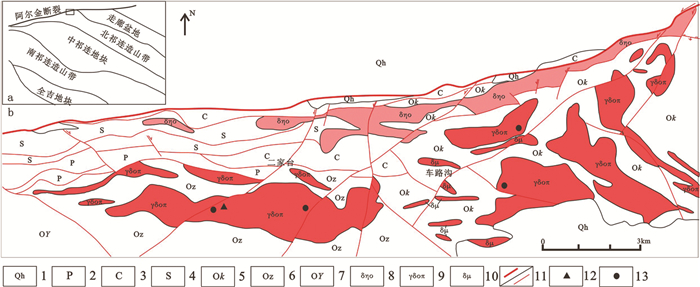
 下载:
下载:
